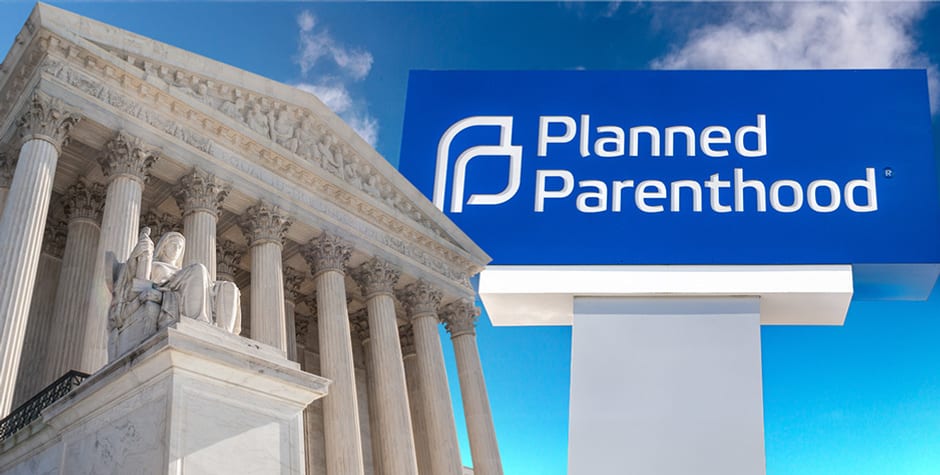Huge Pro-Life Victory at the Supreme Court Allows States To Defund Planned Parenthood
Listen tothis article
The Supreme Court just delivered a game-changing win for the pro-life movement and for every state fighting to strip abortion providers of taxpayer funding.
In response to the shocking video of evidence that Planned Parenthood was engaged in selling aborted babies’ body parts, several states took action to defund Planned Parenthood, removing it as a qualified Medicaid provider. Planned Parenthood filed a lawsuit to strike down that measure.
However, in Medina v. Planned Parenthood, the high Court ruled 6–3 that individual Medicaid recipients cannot sue states for removing Planned Parenthood from their Medicaid programs. This means states like South Carolina – that want to respect life and protect conscience rights – can now take Planned Parenthood out of their Medicaid networks without being hauled into court by third-party activists using patient proxies.
We filed multiple critical amicus briefs in the case. In our most recent amicus brief at the Supreme Court, we urged the Court to resolve this statute “in a manner that least treads upon state sovereignty.”
For years, abortion providers have enjoyed indirect taxpayer funding through Medicaid. A program meant to support lower-income Americans has been turned into a funding funnel for abortion clinics. The state of South Carolina wanted to end this funnel and cut abortion providers from their Medicaid network. In response, Planned Parenthood found a sympathetic Medicaid patient and quickly sued South Carolina under a federal civil rights law (Section 1983) and tried to get a judge to thwart South Carolina’s policy and the will of South Carolina voters. But now, the Supreme Court has slammed that door shut.
The reality is that at the ACLJ, we’ve used Section 1983 lawsuits many times over the years to ensure that the federal government cannot violate an actual constitutional right. But that’s not what Planned Parenthood was trying to do; it was trying to use that law to force states to fund the abortion industry with taxpayer dollars. The Supreme Court said no.
The reality is that at the ACLJ, we’ve used Section 1983 lawsuits many times over the years to ensure that the federal government cannot violate an actual constitutional right. But that’s not what Planned Parenthood was trying to do; it was trying to use that law to force states to fund the abortion industry with taxpayer dollars. The Supreme Court said no.
Justice Gorsuch, writing for the majority, made it clear: The Medicaid statute does not give patients a private right to sue. Only Congress, not activist courts, can authorize that kind of lawsuit. With this opinion, another legal tool of Planned Parenthood vanished.
As we argued in our brief:
Congress did not give clear notice in the [Medicaid Act provision] that states would be subject to private rights of action under § 1983. There is no “more direct affront to state sovereignty,” Murphy, 584 U.S. at 474, than reading § 1396a(a)(23) as Congressional authorization for states to be 1) hauled into federal court to have potentially hundreds of their Medicaid service provider disqualification decisions second-guessed; and 2) coerced to funnel taxpayer money to entities that violate the state’s sincere and deeply held views on the sanctity of human life.
States now have much greater freedom to determine which providers qualify for public funds – based not just on medical credentials, but also on moral and ethical considerations. Planned Parenthood has many reasons to be nervous. Many states will likely begin examining their provider networks and decide whether Planned Parenthood should be removed.
Let’s be clear: This case was not about banning abortion (that battle continues in earnest). It was about who decides where taxpayer dollars go – and whether Planned Parenthood can keep forcing its way into government healthcare programs under the guise of patient rights. The Court’s answer to this question is that states decide, not Planned Parenthood.
This ruling is especially important in the post-Dobbs landscape. Abortion providers are trying everything they can to challenge pro-life laws in state legislatures and courts. But their ability to cling to government funding has been vital to their business model and enabled by activist judges. Their claim that they offer some non-abortion services has successfully helped them to continue snagging taxpayer reimbursement. Medina tears down that argument. If a state determines that an abortion-affiliated provider is not “qualified,” patients can no longer drag that decision into court.
And while the Left is already complaining that this “limits access,” the truth is this ruling expands accountability. No organization, especially one as scandal-plagued as Planned Parenthood, has a constitutional right to taxpayer dollars. States should be free to support life-affirming healthcare providers without fear of litigation engineered by the abortion industry.
At the ACLJ, we’ve long fought to defund Planned Parenthood and protect pro-life policies from judicial overreach. Medina v. Planned Parenthood is a major milestone in that mission – and a reminder that perseverance, principled litigation, and clear constitutional reasoning still win the day.
This is a moment to celebrate – but also a time to prepare. The legal landscape is shifting fast. We must keep defending states that choose life and keep standing up to Planned Parenthood’s relentless attempt to force its ideology on the American people.
We will be working to ensure other states follow South Carolina’s brave example and defund the abortion industry. Lives depend on it.
